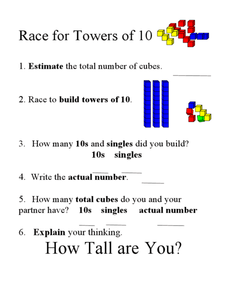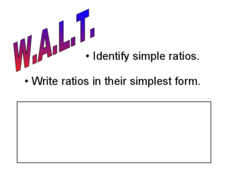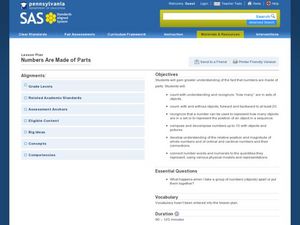Curated OER
Towers of 10
Students complete four worksheets of activities to use cubes to count by 10s. In this counting blocks lesson, students use blocks to count by 10s and complete block counting activities.
Curated OER
Anchoring Numbers to Five and Ten
Young scholars complete activities to relate numbers to each other. In this number connection instructional activity, students count number sets, count forward and backward, and complete other number recognition activities to learn how...
Curated OER
Marble Game
Students practice counting groups of items of six or more. They create equivalent sets.
Curated OER
Counting More or Less
Students practice counting form 0 to 10. They are introduced to the concept of greater than and less than, through the use of pictures. They make flashcards using 3 X 5 cards with stamps or stickers on one side and the corresponding...
Curated OER
Brain Booster
In this counting money worksheet, students read the chart listing the food items and their prices. Students then solve the two questions using the chart and counting the money to find the answers.
Curated OER
Various Volumes
In this volume instructional activity, students create different sized cubes and compare the sizes by pouring sand from one cube into another. Students follow 4 directions and reflect on their findings.
Curated OER
Nets
In this cube worksheet, students work with nets of a cube and determine which net makes an cube. Students answer 7 questions.
Curated OER
Graph the Dots
In this beginning graphing worksheet, students roll two dot cubes of one color and two of another color. Students count the dots for each color and record the data on the graph.
Curated OER
Investigating: Finding the Volume
Sixth graders explore geometry by utilizing colored cubes in class. In this volume lesson, 6th graders identify the different shapes they can create using their colored cubes and identify the formula for finding volume. Students create...
Fuel the Brain
Counting Money
How much money do the children in these word problems have? Through addition and subtraction with the help of visual representations drawn by your pupils, they will understand these skills better.
Pennsylvania Department of Education
Making Cubes
Third graders explore vocabulary associated with three dimensional figures. In this transformations lesson plan, 3rd graders create two dimensional nets for three dimensional figures. Students become familiar with describing two and...
University of Houston
Volume for Rectangular Prisms
Upper graders define perimeter and area of a rectangle, estimate numbers of cubes and determine the maximum amount that will fit in a given space. In this math instructional activity, pupils complete related worksheet, build prisms and...
Curated OER
Building Numbers to 50
Students explore how to represent numbers using cubes and draw them accordingly. They discuss place value and the base ten number system using manipulatives. Students roll a dice and take that many blocks. They write down their resulting...
Curated OER
Counting On
In this math worksheet, students practice addition of one digit numbers and adding on addition. Students start with one set, then add more. Example: Gus Plus has 5 cubes. He collects 8 more. He now has----. There are 18 problems on this...
Curated OER
Counting On
For this addition worksheet, 1st graders solve simple addition word problems. Students are encouraged to use "counting on" technique to solve the problems.
Curated OER
Counting Across Decades, Using Number Lines
Your youngsters will use number lines to determine how many more the child in each story problem needs.
Primary Resources
Identifying Ratios
Kids complete three different activities to better understand how to identify ratios and then write them in simplest form. Ratios are represented by fraction strips of two different colors. Pupils write what ratio of blue to red is...
Illustrative Mathematics
Christo’s Building
Hook your charges on how to solve a real-world art problem with mathematics by showing works of Christo. You can find eye-catching images on the Christo and Jeanne Claude webpage. Here, math learners help Jean Claude and Christo prepare...
Curated OER
Finding Volume
Sixth graders develop a rule for finding the volume of rectangular solids using colored cubes. They investigate the properties of solid figures and find the volume of an object by counting units. Students fill spaces with standard-sized...
Curated OER
Games for Probability: In-Class and Powerball Simulation
Your soon-to-be statisticians play a game to understand the difference between independent and dependent experiments and probability. They draw colored cubes from a bag and then, by either replacing the cube in the bag, or not, for each...
Key Curriculum Press
Lesson 10.2 Volume of Prisms and Cylinders
Tenth graders investigate volume in class and in the real world. They explore volume of cylinders and prisms as it relates to different subjects. Pupils also investigate how important volume is in different career field.
Curated OER
Teddy Bears and Friends
Children begin by making direct comparisons between objects and putting a number of objects into order according to length. They are also introduced to measuring with multi-link cubes which allows them to compare objects which cannot be...
Pennsylvania Department of Education
Numbers Are Made of Parts
Children play with barnyard animal cards to practice composing and decomposing numbers. With their "secret number" of animal cards in a cup, they shake and spill them onto a barn story board, counting how many animals fall in the barn...
Curated OER
Data With Candy
Young scholars, while utilizing the classroom and the computer lab with a bag of colored candy, gather and interpret data, calculate averages and draw conclusions and draw a bar graph. They estimate how many candies are in the bag, what...
Other popular searches
- Counting Cubes Worksheets
- Volume by Counting Cubes
- Counting Cubes and Sorting
- Counting Cubes for Area
- Volume Counting Cubes
- Counting Cubes in Volume
- Counting Cubes in Addition
- Counting Cubes for Volume
- Counting Cubes in Structures

























